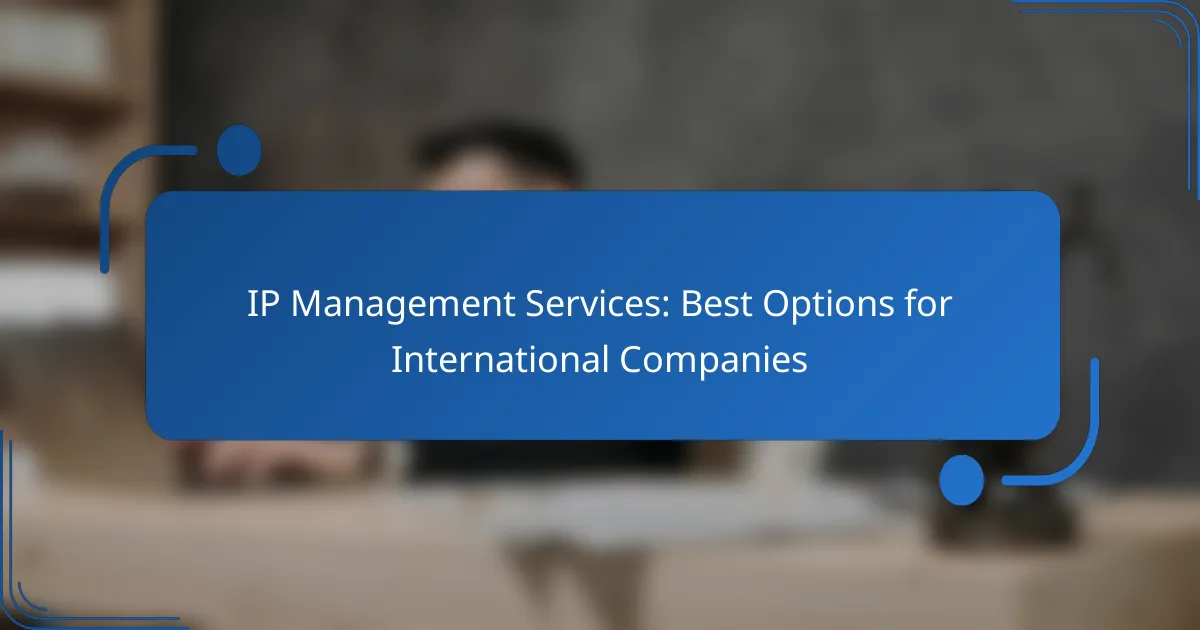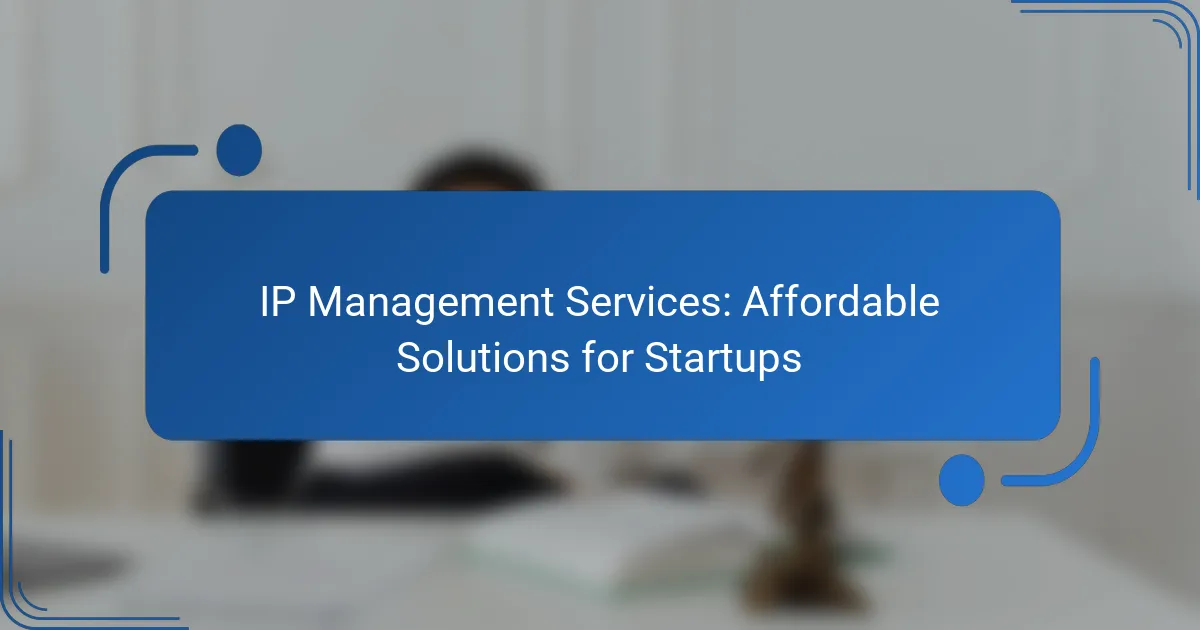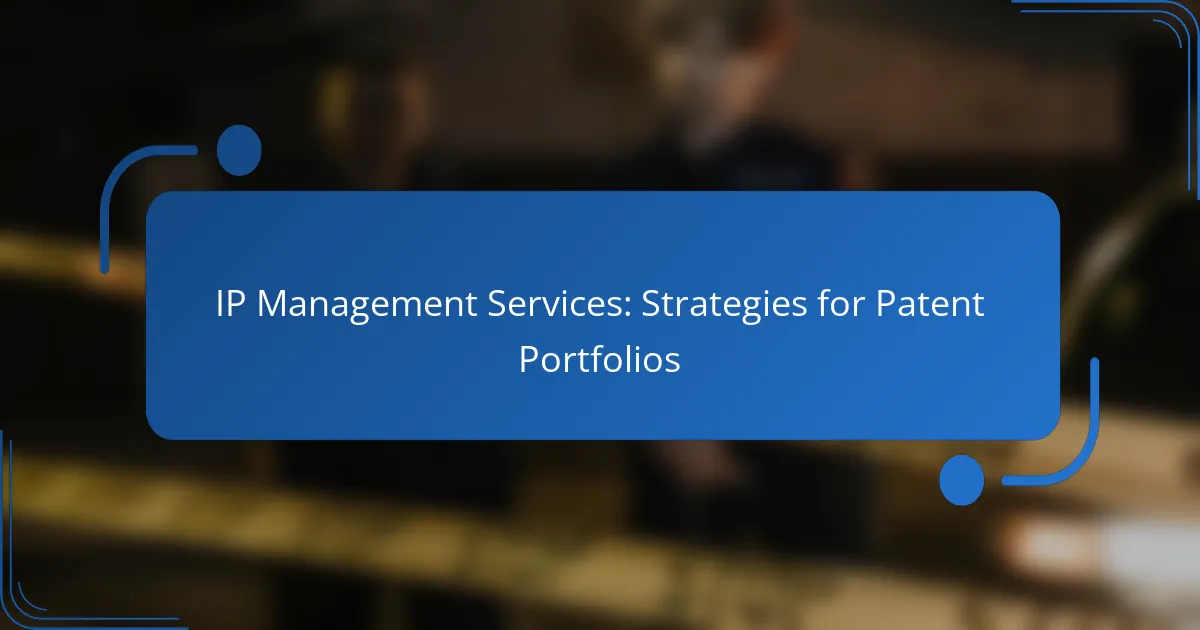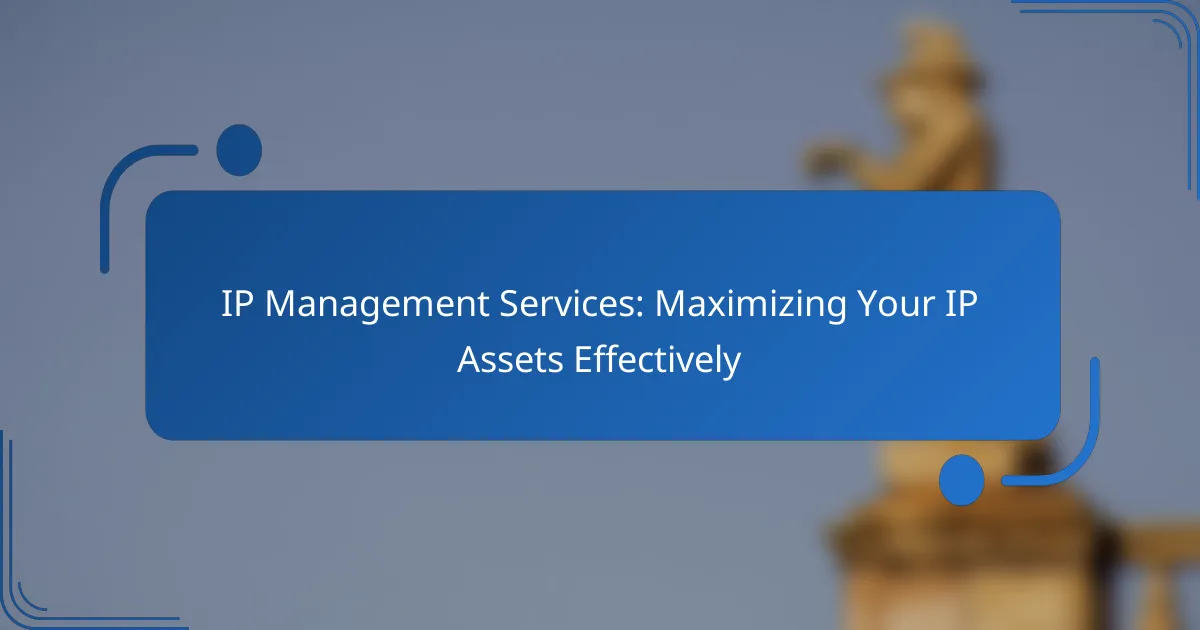For international companies, effective IP management services are essential for safeguarding intellectual property across diverse jurisdictions. These services not only streamline the protection and administration of IP rights but also enhance compliance and operational efficiency, allowing businesses to navigate complex regulations with ease. By choosing the right IP management solutions, companies can optimize their portfolios and ensure robust protection of their valuable assets.
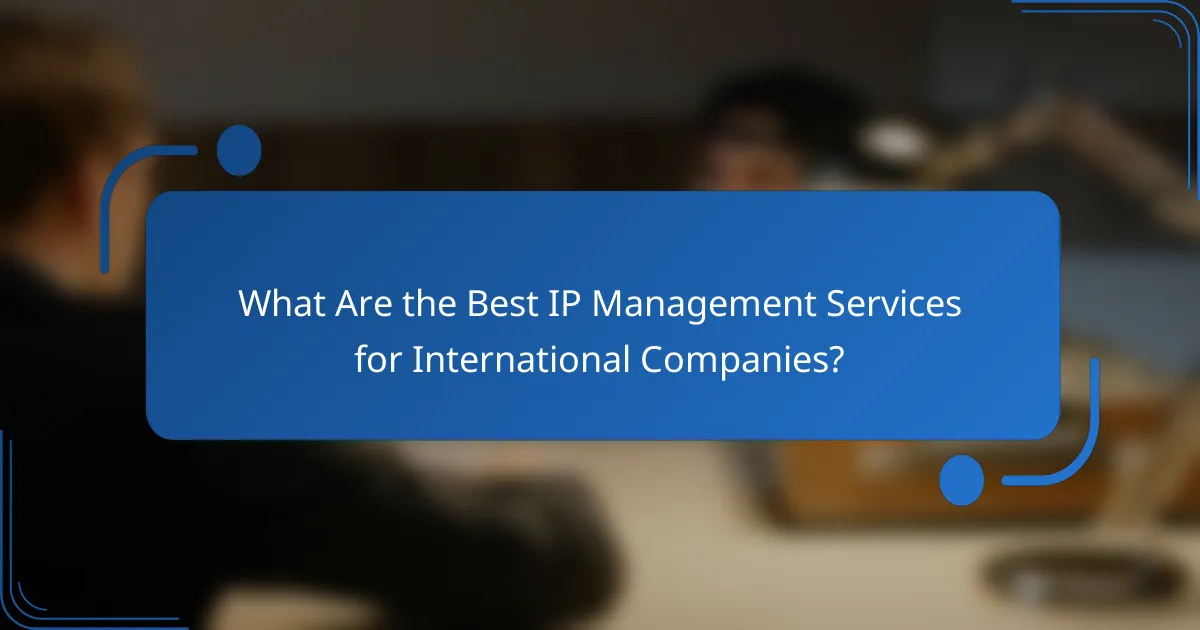
What Are the Best IP Management Services for International Companies?
The best IP management services for international companies streamline the protection and administration of intellectual property across various jurisdictions. These services offer tools for tracking, managing, and enforcing IP rights, ensuring compliance with local regulations and facilitating global operations.
Service A: IPfolio
IPfolio is a cloud-based IP management solution designed for companies of all sizes, particularly those with international portfolios. It provides features such as automated reminders for renewals, customizable dashboards, and comprehensive reporting tools to help manage patents, trademarks, and copyrights efficiently.
One key advantage of IPfolio is its user-friendly interface, which simplifies the process of tracking IP assets. Companies can easily visualize their IP landscape and make informed decisions regarding their IP strategy.
Service B: CPA Global
CPA Global offers a robust suite of IP management services tailored for multinational corporations. Their platform includes tools for managing patent and trademark portfolios, as well as analytics to assess the value of IP assets. They also provide legal support for IP enforcement and litigation.
With a focus on compliance, CPA Global helps companies navigate the complexities of international IP laws. Their extensive network of legal experts ensures that clients receive timely advice on local regulations and best practices.
Service C: Anaqua
Anaqua is an integrated IP management platform that combines portfolio management with innovation management. It is particularly beneficial for companies looking to align their IP strategy with business objectives. Anaqua’s features include collaboration tools, analytics, and customizable workflows.
Companies using Anaqua can benefit from its ability to track innovation processes alongside IP management, fostering a culture of innovation while protecting valuable assets. This dual approach can enhance overall business performance.
Service D: PatSnap
PatSnap specializes in IP analytics and intelligence, providing insights that help companies make strategic decisions about their IP portfolios. Their platform offers tools for searching patents, analyzing competitors, and identifying trends in technology and innovation.
By leveraging PatSnap’s analytics, international companies can gain a competitive edge in their respective markets. Understanding the IP landscape allows businesses to identify opportunities for growth and avoid potential infringement issues.

How Do IP Management Services Benefit Global Businesses?
IP management services provide global businesses with streamlined processes, enhanced compliance, and cost efficiency, all of which are crucial for protecting intellectual property across multiple jurisdictions. By leveraging these services, companies can navigate complex international regulations and optimize their IP portfolios effectively.
Streamlined IP Processes
Streamlined IP processes simplify the management of intellectual property across various countries. This includes centralized tracking of patents, trademarks, and copyrights, which reduces administrative burdens and minimizes the risk of errors. Utilizing software solutions can automate many routine tasks, allowing teams to focus on strategic decisions.
For example, a global company can use an IP management platform to monitor deadlines for renewals and filings, ensuring timely actions that prevent lapses in protection. This proactive approach can save time and resources, enhancing overall operational efficiency.
Enhanced Compliance
Enhanced compliance is vital for businesses operating internationally, as IP laws vary significantly by country. IP management services help companies stay updated on local regulations and ensure adherence to international treaties. This reduces the risk of legal disputes and potential fines, which can be costly and damaging to a brand’s reputation.
For instance, understanding the nuances of the European Union’s General Data Protection Regulation (GDPR) or the United States Patent and Trademark Office (USPTO) requirements can be complex. IP management services can provide guidance and support to navigate these regulations effectively.
Cost Efficiency
Cost efficiency in IP management can lead to significant savings for global businesses. By consolidating IP services and utilizing technology, companies can reduce the costs associated with maintaining and enforcing their intellectual property rights. This includes minimizing legal fees and administrative expenses.
Additionally, businesses can benefit from bulk filing discounts or subscription models offered by IP management providers, which can lower costs further. Investing in these services often results in a better return on investment by protecting valuable assets and reducing the likelihood of costly litigation.
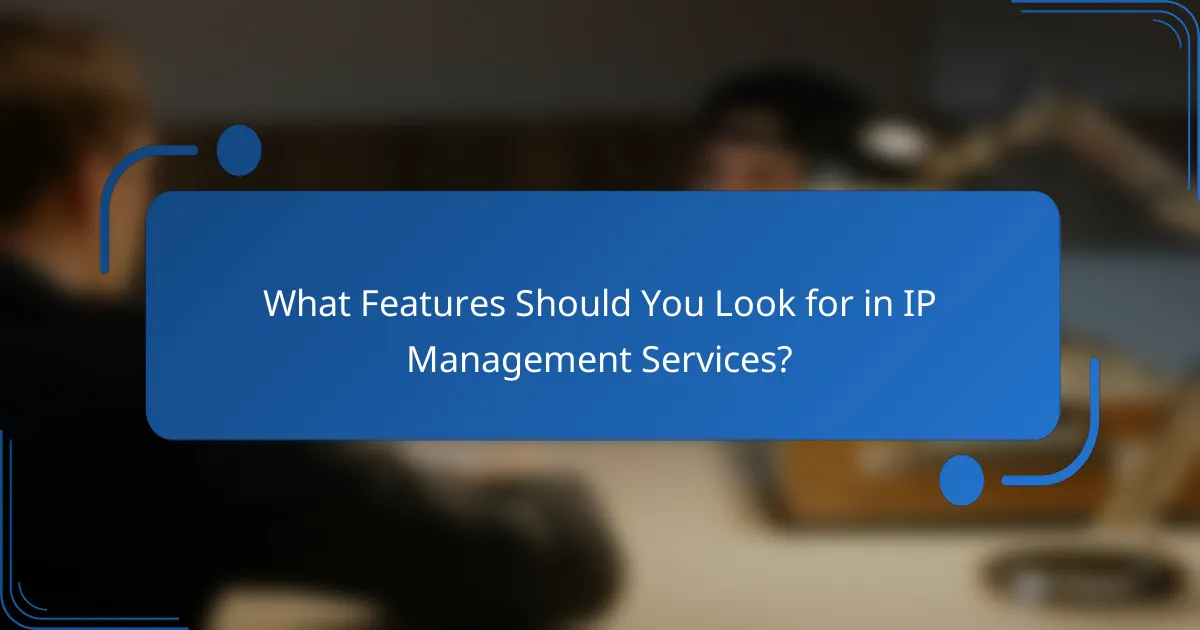
What Features Should You Look for in IP Management Services?
When selecting IP management services, focus on features that enhance efficiency, scalability, and user experience. Key aspects include the ability to grow with your business, seamless integration with existing systems, and a user-friendly interface that simplifies navigation and task execution.
Scalability
Scalability is crucial for international companies as it allows IP management services to adapt to growing demands. Look for solutions that can handle an increasing volume of intellectual property assets without compromising performance. A scalable system should accommodate additional users, features, and storage as your business expands.
Consider platforms that offer tiered pricing or modular features, enabling you to pay for only what you need initially and add more capabilities as required. This approach helps manage costs while ensuring your IP management can evolve alongside your business.
Integration Capabilities
Integration capabilities determine how well your IP management service can work with other tools and systems your company uses. A robust service should seamlessly connect with existing software, such as CRM systems, legal databases, and financial platforms, to streamline workflows and data sharing.
Evaluate services that offer APIs or pre-built integrations with popular applications. This connectivity reduces manual data entry, minimizes errors, and enhances overall efficiency. Ensure the service can adapt to your specific technology stack, particularly if your company operates across various regions with different regulatory requirements.
User-Friendly Interface
A user-friendly interface is essential for ensuring that all team members can effectively utilize the IP management service. Look for platforms that prioritize intuitive design, making it easy to navigate through features and access critical information quickly.
Consider services that offer customizable dashboards, allowing users to tailor their experience based on their roles and preferences. Training resources, such as tutorials and customer support, can also enhance user experience, ensuring that your team can maximize the benefits of the IP management system.
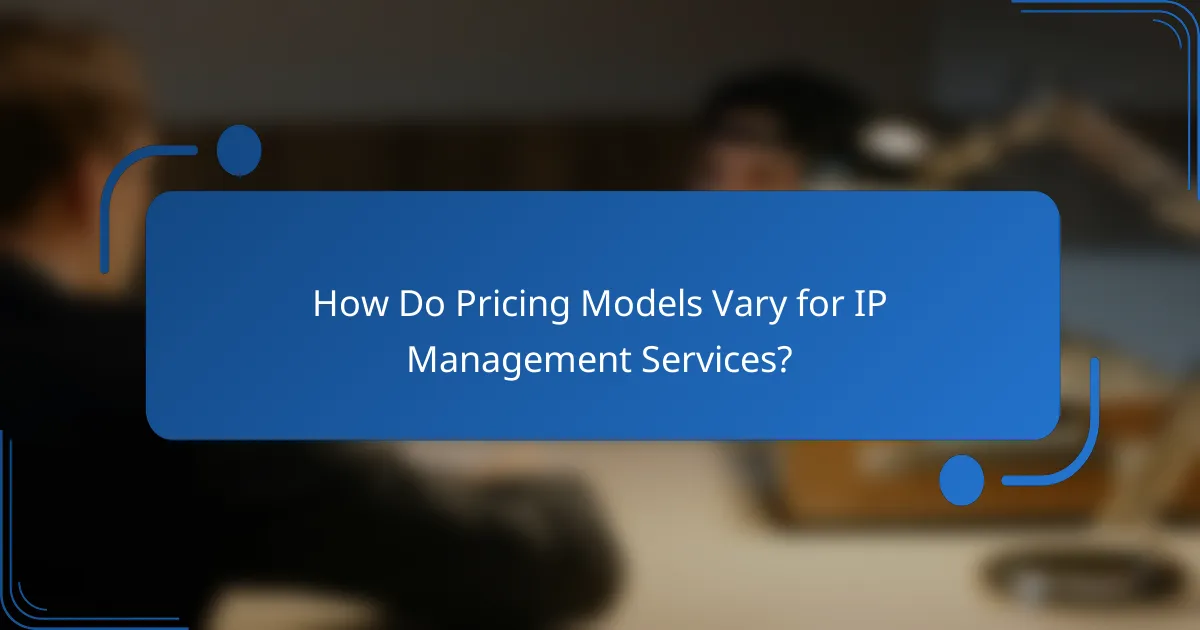
How Do Pricing Models Vary for IP Management Services?
Pricing models for IP management services differ significantly based on the service provider and the specific needs of international companies. Understanding these variations is crucial for selecting the most cost-effective option that aligns with your business strategy.
Subscription-Based Pricing
Subscription-based pricing involves paying a regular fee, typically monthly or annually, for access to IP management services. This model is beneficial for companies that require ongoing support and regular updates, as it provides predictable costs and often includes a range of services.
When considering this model, evaluate what services are included in the subscription. Some providers may offer tiered subscriptions that grant access to additional features or higher levels of support at a higher price point.
Pay-Per-Use Models
Pay-per-use models charge clients based on the actual services utilized, making it a flexible option for companies with fluctuating IP management needs. This model is ideal for businesses that may not require constant support or have varying workloads throughout the year.
However, it’s essential to track usage closely, as costs can accumulate quickly if services are used more frequently than anticipated. Always review the pricing structure to understand the rates for different services to avoid unexpected expenses.
Tiered Pricing Structures
Tiered pricing structures offer multiple levels of service at different price points, allowing companies to choose a package that best fits their needs. This model can be advantageous for businesses looking to scale their IP management services as they grow.
When selecting a tier, consider the specific features and support levels included at each stage. It’s often beneficial to start with a lower tier and upgrade as your requirements increase, ensuring you only pay for what you need at any given time.
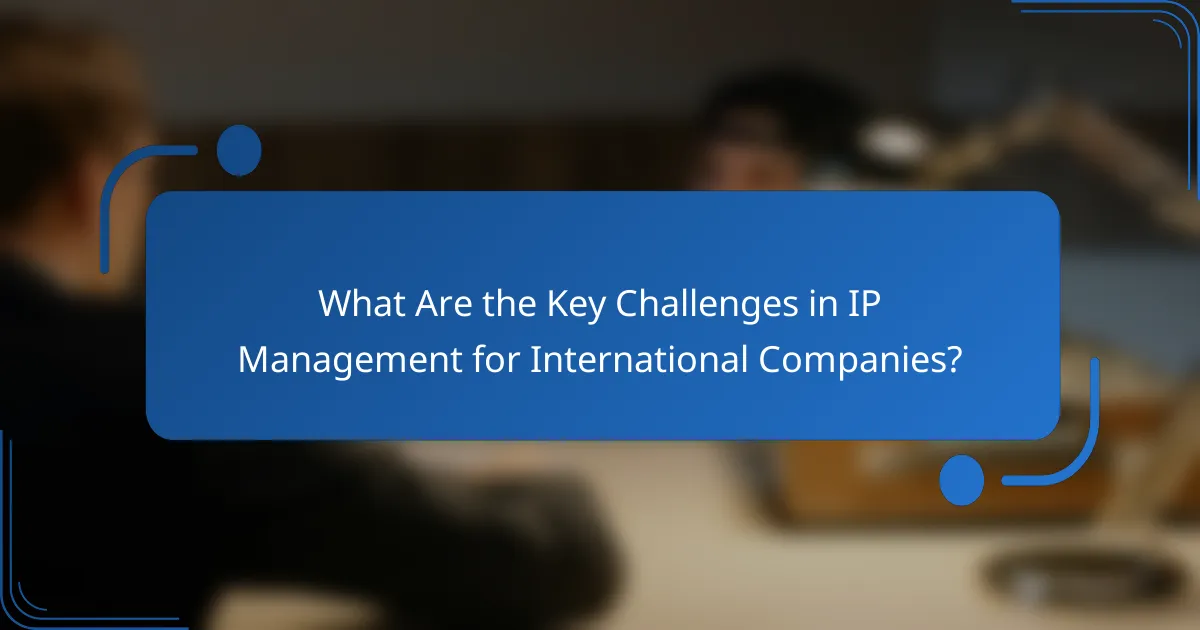
What Are the Key Challenges in IP Management for International Companies?
International companies face several key challenges in IP management, including navigating different legal systems, understanding varying regulations, and protecting intellectual property across multiple jurisdictions. These complexities can lead to increased costs and potential legal disputes if not managed effectively.
Jurisdictional Variability
Jurisdictional variability refers to the differences in IP laws and regulations across countries. Each jurisdiction may have unique requirements for registering and enforcing intellectual property rights, which can complicate global IP strategies. Companies must be aware of these differences to avoid legal pitfalls.
For example, trademark registration processes can vary significantly; some countries require use in commerce before registration, while others allow for intent-to-use applications. Understanding these nuances is crucial for effective IP management.
To navigate jurisdictional variability, companies should consider engaging local legal experts who can provide insights into specific laws and help streamline the registration process. Regularly reviewing IP portfolios in light of jurisdictional changes can also mitigate risks associated with non-compliance.
